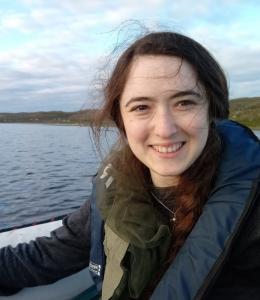
Dr Erika De Vivo
Postdoctoral Fellow, November 2022 - September 2023
Home institution: Università degli Studi di Torino
Erika De Vivo is an early career researcher specialising in cultural anthropology and Sami studies. Her main research interests are Indigenous efflorescence, linguistic landscapes and soundscapes in Indigenous contexts, Sámi cultural heritage and art, Sámi cultural creativity and political activism. Erika has carried out extensive fieldwork in Sapmi (mostly in Troms-Finnmark County, Norwegian side of Sapmi) working on various Sámi festivals such as Márkomeannu, and Riddu Riđđu as well as on the Márka-Sámi Gállogieddi Friluft Museum. In December 2021, she defended her PhD dissertation «Putting the Márka on the map» An anthropological perspective on cultural efflorescence in Stuornjárga, Norwegian side of Sápmi at the University of Torino. The dissertation focuses on Márkomeannu, an annual Sámi festival held at Gállogieddi, on the Norwegian side of Sápmi. For 16 months between 2018 and 2020, Erika has been a visiting PhD researcher at SESAM Centre for Sámi Studies at UiT Tromsø Arctic University (Norway). Erika is an honorary fellow in Cultural Anthropology at the Department of Modern Languages and Cultures, University of Turin. During the academic year 2021-2022 she was adjunct lecturer in Qualitative Methods in Global South Studies and teaching assistant in Cultural Anthropology at the same university. Erika’s most recent publications focus on articulations of Sami futurism in festival settings and on Márka-Sámi placenames as repositories of meaning.
Project title: “Gulak gus buzza?” An anthropological study of Márkomeannu Festival as a site of linguistic activism through the analysis of its linguistic landscape
The project “Gulak gus buzza?” (Márka-Sami for “do you hear the buzz?”) addresses Márkomeannu festival as a site of linguistic and toponymic activism and examines the use and displaying of Sámi languages in public spheres as collective practices counteracting stigmatization and reversing language shift. Hence, this project seeks to analyse the linguistic landscape of the Márka-Sami festival Márkomeannu and of its virtual spaces (in particular, the festival’s official website and its various social media accounts) through the lenses of cultural anthropology, heritage, digital humanities and linguistic landscape studies. Such an interdisciplinary approach allows a broader understanding of the premises of, and the dynamics leading to, current phenomena of cultural efflorescence in this area. It also permits comprehension of the entwinement of interdependent processes such as heritagization practises valorizing Indigenous Sámi cultural heritage beyond museums, and the counteracting toponymic silencing and colonialism by restoring Indigenous Sámi placenames which are often repositories of Sámi history while also encapsulating localized Indigenous ontologies.
